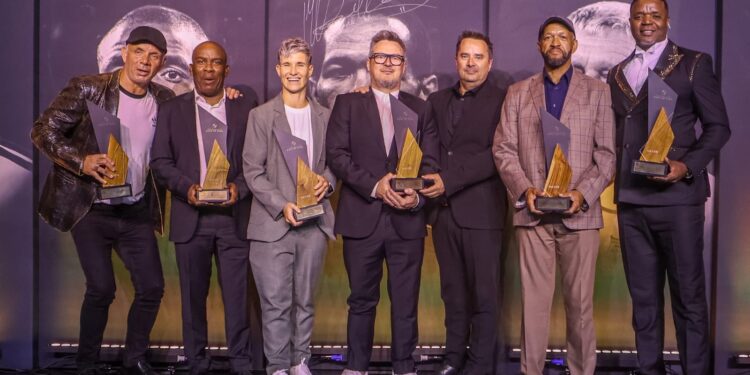In an emotional evening that blended nostalgia, pride and national gratitude, the South African Hall of Fame inducted seven of the country’s greatest footballing figures at its second Soccer Legends Induction, staged at Silverstar Casino on 14 November 2025. The ceremony celebrated careers that shaped a nation’s love for the game — and reminded attendees why sport can uplift, unify and inspire.
The 2025 class paid tribute to living heroes and two posthumous icons whose names are lodged in South Africa’s sporting memory: Doctor Khumalo, Janine van Wyk, Mark Fish, Mark Williams, Aaron Mokoena, and, honoured after their passing, Clive Barker and Phil Masinga.
Two posthumous tributes — memories and family voices
The night carried particular weight with the posthumous induction of Phil Masinga and Clive Barker. Masinga — the revered striker whose goal famously helped send Bafana Bafana to their first FIFA World Cup in 1998 — was represented by his children Tinyiko and Sifiso Masinga, who delivered a deeply personal tribute to their father’s humility and generosity.
“This moment means more to us as a family than we can ever put in words,” they said, recalling how their father rose from Khuma to live his family’s wildest dreams while remaining deeply grounded. “If he succeeded, everyone he loved succeeded with him as well. That was his heart. That was our dad.”
Clive Barker, the tactical genius who guided South Africa to the 1996 Africa Cup of Nations crown, was represented by his son John Barker, who reflected on his father’s commitment to the sport and its power to bridge the divisions of apartheid-era South Africa. “Sport, and in particular football, has the ability to break down barriers,” John Barker said. “The team… represented the possibility of what South Africa could and has become.”
A roll call of living legends
Also taking centre stage were five living figures whose careers trace the modern history of South African football:
-
Aaron Mokoena, who debuted for Bafana Bafana at just 18 and went on to captain the national team, spoke about ambition and the responsibility of mentorship: “I have travelled the world because of the sport that I like. I always said, I wanted to break records. I wanted to be the best… I always say to the kids that I coach, it’s how much you want it.”
-
Janine van Wyk, South Africa’s most-capped footballer and a pioneer for women’s football, reflected on sacrifice and progress for female athletes, calling the honour “not just mine” but belonging to every woman who fought for recognition.
-
Mark Fish, a resolute defender and member of the 1996 AFCON squad.
-
Mark Williams, the striker who scored twice in the seminal 1996 AFCON final.
-
Doctor Khumalo, the midfield maestro and symbol of excellence from the early Bafana era, was recognised in the presence of family and represented on stage by his business manager Jazzman Mahlakgane.
The evening combined acceptance speeches with personal reflections that connected the players’ achievements to national narratives of resilience and unity.
“Celebrate | Inspire | Empower”
Johnny Burger, Chairman of the South African Hall of Fame, framed the evening in the organisation’s founding values: “The stories of these icons are more than just sporting triumphs. They are symbols of perseverance, unity, and national pride.” The Hall of Fame — a registered non-profit trust established in 2017 — exists to preserve such stories and to ensure that the country’s sporting legacies continue to inspire future generations.
Part of that mission is the Legacy Project, which channels the Hall of Fame’s platform into bursaries, opportunities and practical support for talented youth with limited resources. The induction ceremony, therefore, doubled as both celebration and a call to action: to use sporting memory as a tool for social uplift.
Why this matters
Honouring players from different eras and both genders sent a clear signal about the Hall of Fame’s purpose: to reflect a broad and inclusive history of South African sport. From Clive Barker’s tactical leadership in the post-apartheid era to Janine van Wyk’s pathbreaking role in women’s football, the inductees’ stories collectively narrate how football has shaped identity, offered mobility and created community.
The South African Hall of Fame’s second Soccer Legends Induction was, by all accounts, an evening that balanced ceremony with storytelling — a public reminder that great athletes become more than names on a scoresheet; they become beacons for future generations.
For more information on the Hall of Fame and the Legacy Project, visit https://halloffame.co.za/.



































